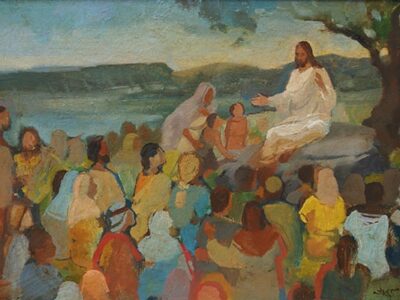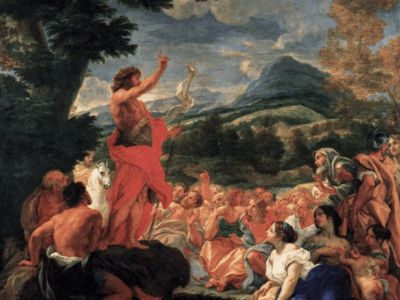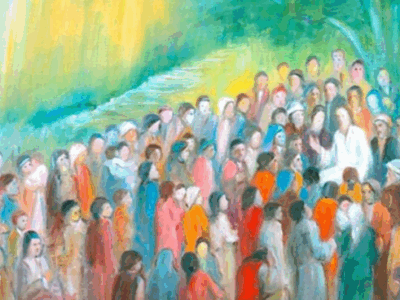
Law and Tradition
Year B
Deuteronomy 4:1-2, 6-9
Psalm 15
James 1:17-27
Mark 7:1-8, 14-15, 21-23
May the words of my mouth O God… speak your truth…
When I used to attend Friday night services at synagogue… we used a prayer book… that contained a prayer… that’s similar to what we just heard from Deuteronomy… but the one we read at Shabbat services… comes from Deuteronomy 6… and interestingly… the translation that’s printed in that prayer book… comes almost entirely from the King James Bible… it reads…
Thou shalt love the Lord thy God… with all thy heart… with all thy soul… and with all thy might… and these words… which I command thee this day… shall be upon thy heart… thou shalt teach them diligently unto thy children… and shalt speak of them when thou sittest in thy house… when thou walkest by the way… when thou liest down… and when thou risest up… thou shalt bind them for a sign upon thy hand… and they shall be for frontlets between thine eyes… thou shalt write them upon the doorposts of thy house… and upon thy gates… that ye may remember and do all My commandments… and be holy unto your God…
Beautiful language… containing words of serious commitment… you see… after spending forty years wandering in the wilderness… Moses wanted to be sure the people understood the seriousness of what they were embarking on… and God wanted to be sure the people would be faithful… ] and so Moses refers to the Law which was given on Sinai… and later expanded in Leviticus… the Law which was to guide and guard them… and one of the caveats is… you must neither add anything to what I command you… nor take away anything from it…
In this morning’s Gospel… Jesus and the disciples are eating… it’s hard to imagine everything they’ve endured… and I think it’s fair to say they know the Law… but they’ve eaten without washing their hands… and the Pharisees and scribes descend on them…
The Pharisees are right… the Law is important… people look to the Law to guide them… and to give them an identity… but we have to ask… we have to wonder whether have they begun to make the Law into an idol… ] Amy Howe… of Evergreen Presbyterian Church… wrote… when we begin to worship… that which gives us a sense of order… or bow down to a doctrine… we cease to be faithful to our Creator…
And we must remember that purity laws… dietary laws… were very important… and still inform what some Jews today… or Muslims for that matter… will or won’t eat… and I wonder whether the writers of the Law were aware of some commonsense issues that most other people didn’t know about… that pork can contain trichinosis… that shellfish… like shrimp can harbor dangerous bacteria… and even as recently as the Civil War… battlefield doctors were just learning about bacterial infections and how they were transmitted…
So there may have been some practical value in what the Pharisees were talking about… but let’s dig down a bit… Professor Raj Nadella writes… in an attempt to explain Jewish customs to a Gentile audience… the Markan narrator writes that the… Pharisees… and all the Jews… do not eat unless they thoroughly wash their hands… really… every single one of them… all the time… at every meal… ] and Mark follows up with other generalizations about cups… pots… and bronze kettles… but the text clearly presents these practices not as Law… but as traditions… and traditions rarely if ever carry the weight of Law… it may for example be your family’s tradition to have pecan pie at Thanksgiving instead of pumpkin pie… but it’s certainly not the Law… pecan pie is just fine… but Mark’s placement of this text in parentheses… is as intriguing as the content itself… it amounts to a narrative aside… like a tweet… intended for a select few…
But what’s dangerous… is that Mark’s account of Jewish rituals… caricatures the community in harmful ways… it makes it monolithic… and robs us of our ability to understand nuance and personal preference… and just as Jesus reinterpreted sacred texts in his time… we are invited to push back against stereotypes in ours…
Jesus says it’s what comes out of the mouth… and from the heart… that defiles… and this is a real sea-change… because for example… the prohibitions against eating meat along with its mother’s milk… which are found in Exodus 23:19… Exodus 34:26… and in Deuteronomy 14:21… and which form the basis of Kosher practices… no longer apply… so you can eat pizza with Italian meatballs… and Philly cheesesteak subs… these are no longer deal breakers…
But if you defame someone… or slander them… if you’re deceitful… if what you do is at odds with what you say… if your actions are motivated by wickedness… envy or pride… then it’s these things… which come from within a person… these are the things that defile… and why do they defile… because they damage relationship… and ultimately… it’s all about relationship…
That’s why… over the course of time… there are some things that must be added to the Law… or taken away from it… Pastor Gibson Stroupe… wrote that if a tradition is to be passed on to future generations… those generations must wrestle with the meaning of the tradition in their own time… indeed… that wrestling developed Midrash… a commentary to help guide us… as we explore scripture’s meaning…
And so in our time… we may ask… not whether… but how tradition has been used to exclude rather than include… how it’s been used to judge instead of forgive… how it’s been used to justify violence instead of seeking peace…
In our social contracts… we hold on so tightly to our founding documents… and insist that they mean today… all that they meant then… we risk turning them into idols too… and we cease to be faithful to our Creator… I don’t believe that there are easy solutions to these challenges… since we are all works in progress… and the things Jesus asks us to do can be difficult… they require some practice… they require some discipline… that’s why we’re called disciples… oh… we can read about the physics of skiing… or how to shape clay on a potter’s wheel… and understand it all quite well… but we don’t learn to ski or make pottery by taking an online course… we must get out on the slopes or sit at the wheel and practice… and the same thing is true for Christianity…
St. John Chrysostom… the first bishop of Constantinople…offered five paths of growth… the first is the condemnation of our own sins… the second is to put out of our minds the harm done us by our enemies… the third consists of prayer that is fervent and comes from the heart… the fourth is almsgiving, whose power is great and far-reaching… and the fifth is living a modest and humble life… and the example of this he cited… is found in Luke 18:9-14… about the Pharisee and the tax collector… the latter… who humbly acknowledged his sinfulness and asked for God’s mercy…
So I ask us to consider what our own purity codes are… out of what have we made idols… what pushes us to point fingers… and how do we let go of all that… and so we may ask the question… how and when can we let go of being right… in favor of being in relationship…








